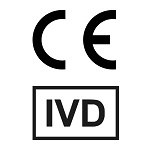-
SKU DIA-AX1 Specificity Species Reactivity Human
Immunogen Recombinant protein fragment of human ATRX
Host Species Mouse
Isotype IgG1/k
Clone AX1
Clonality (Mono-/Polyclonal) monoclonal
Application Immunohistochemistry (IHC), Immunohistochemistry (Paraffin-embedded Sections)
Conjugation unconjugated
Dilution Histo-/Cytochemistry 1:100 – 1:200
Format 0.05% NaN3, 2% BSA, in PBS (pH 7.4), lyophilisate, purified antibody (from culture supernatant)
Product line / Topic Neurobiology, Tumor Marker / Biology
Intended Use for In vitro Diagnostic Use
Temperature - Storage 2-8°C
Temperature - Transport at room temperature
Search Code DIAAX1, FFPE, Paraffin
Manufacturer / Brand dianova
Uniprot_ID P46100
Gene_ID 546
Alias ATP-dependent helicase ATRX, RAD54L, Transcriptional regulator ATRX, X-linked helicase II, X-linked nuclear protein, XH2, XNP, Znf-HX
-
Immunohistochemistry of human ATRX in standard formalin-fixed paraffin-embedded glioma sections.
A: Strong nuclear reaction of anti-ATRX antibody clone AX1 in 1p/19q co-deleted glioma.
B: Loss of nuclear ATRX protein expression in glioma with intact chromosomes 1p/19q documented by anti-ATRX immunohistochemistry.(A) ATRX stain of 1p/19q deleted glioma
(B) ATRX loss in glioma with intact 1p/19q
(pictures courtesy of Prof. Marcus Glatzel, Department of Neuropathology, UKE, Hamburg, Germany)
Combined immunohistochemistry of ATRX (dianova clone AX1) and IDH1R132H (dianova clone H09)
substitutes molecular testing.The routine practical approach for diagnosing astrocytomas and oligodendrogliomas begins with perfoming IHC for ATRX and IDH1 R132H expression. Stepwise analysis of molecular parameters with initial IHC for ATRX and IDH1 R132H followed by 1p/19q analysis and then by IDH sequencing significantly reduces the number of molecular tests required for unequivocal diagnosis (Reuss et al., 2015). Learn more…
Background
ATRX mutation, IDH1 mutation and chromosomal 1p/19q co-deletion are key molecular factors for the subtype diagnosis of diffuse gliomas. ATRX mutations in gliomas result in the loss of nuclear ATRX expression, which can be diagnosed by IHC analysis. Loss of ATRX expression is close to being mutually exclusive to 1p/19q co-deletion in IDH1 mutated tumors. Consequently, ATRX immunohistochemistry can be performed to replace laborious analysis of 1p/19q status by FISH techniques.
References
- Reuss DE et al. ATRX and IDH1-R132H immunohistochemistry with subsequent copy number analysis and IDH sequencing as a basis for an “integrated” diagnostic approach for adult astrocytoma, oligodendroglioma and glioblastoma. Acta Neuropathol. 129(1):133-146, 2015
- Leeper HE et al. IDH mutation, 1p19q codeletion and ATRX loss in WHO grade II gliomas. Oncotarget 6(30): 30295-05, 2015
- Cai J et al. Detection of ATRX and IDH1-R132H immunohistochemistry in the progression of 211 paired gliomas. Oncotarget 7(13): 16384-95, 2016
- Takano S et al. Immunohistochemistry on IDH 1/2, ATRX, p53 and Ki-67 substitute molecular genetic testing and predict patient prognosis in grade III adult diffuse gliomas. Brain Tumor Pathol. 33(2):107-116, 2016
- Ebrahimi A et al. ATRX immunostaining predicts IDH and H3F3A status in gliomas. Acta Neuropathol Commun. 4(1):60, 2016
- Ikemura M et al. Utility of ATRX immunohistochemistry in diagnosis of adult diffuse gliomas. Histopathology 69(2): 260-267, 2016
- Liu N et al. Immunostaining of IDH1 R132H and ATRX proteins in the classification of adult glioblastomas. Int J Clin Exp Pathol 9(12): 12849-54, 2016
Related Products
DIA-H09 – Anti-IDH1 R132H (Hu) from Mouse (Clone: H09) – 500 µl
DIA-670-P1 – Anti-Ki-67/MIB1 (Hu) from Mouse (Clone: Ki-67P) – unconj. – 1 ml
-
ATRX_intact-4E3 ATRX_intact_and_loss ATRX_loss-4E3
Anti-ATRX (Hu) from Mouse (Clone: AX1)
Referencia DIA-AX1
embalaje : 500µl
Marca : Dianova
Para uso de diagnóstico in vitro. Sólo para uso profesional.
Usted podría estar interesado también en los siguientes productos:
Referencia
Descripción
Cond.
Precio Sin IVA





 IDH1R132H+ATRX Glioma-IHC flyer
IDH1R132H+ATRX Glioma-IHC flyer